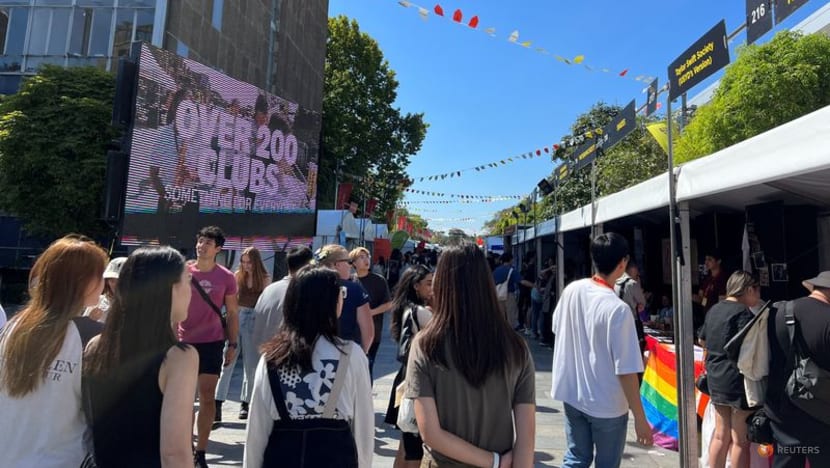Australia's new visa rules unlikely to deter Singapore students from considering further education there: Observers
Australian Prime Minister Anthony Albanese said the country's migration numbers needed to be wound back to a “sustainable level”.

Students walk past stalls during the orientation week at The University of Sydney, in Camperdown, Australia Feb 15, 2023. (Photo: Reuters/Stella Qiu)

This audio is generated by an AI tool.
SINGAPORE: Australia's plans to tighten visa rules are unlikely to deter Singapore students from considering furthering their studies there, said observers.
This is due to the close proximity and the recognition of courses offered in Australia, such as its physiotherapy and occupational therapy programmes.
Australia on Monday (Dec 11) said it would tighten visa rules for international students and low-skilled workers in an attempt to reduce migrant intake.
Under the move, international students will need higher ratings on English tests. It will also end settings that allow students to prolong their stay in Australia.
IMPACT ON SINGAPOREANS LIKELY TO BE LIMITED
Although the immigration reform is still in the early stages, overseas education consultancies expect the impact on Singaporeans to be limited.
AUG Student Services believes Singapore students looking to study in Australia may be required to take an English test.
"I think by and large Singaporean students should not be too affected, because we are an English-speaking country. Our schools (teach) in English,” said the firm’s country manager Nick Lim.
“However, looking forward, there may be some incidences or very particular incidences, where such a rule may require a Singaporean student to take an additional English test on top of the studies that they've done in Singapore. So this remains to be seen at this point in time."
Mr Lim said there have been a handful of queries from parents, including whether this will mean longer processing time for visa applications, which typically takes up to a month.
"In terms of delay, it remains to be seen,” he added. “But the delay could come from that English portion, for the students to be able to book the English test to meet the requirements and have the documents submitted for the actual student visa application.”
The decision to tighten visa rules comes after net immigration was expected to have peaked at a record 510,000 in 2022 to 2023, with the increase largely driven by international students.
Official data showed it was forecast to fall to about a quarter of a million in 2024 to 2025 and 2025 to 2026, roughly in line with pre-COVID levels.
BRINGING MIGRANT NUMBERS TO A "SUSTAINABLE LEVEL"
Demographer and social researcher Liz Allen, a senior lecturer at the Australian National University, believes there will be an attempt to diversify where overseas students are coming from in the short term.
This could see more places for students from some Southeast Asian countries – where English proficiency is fairly high – to move to Australia for further education, she added.
“Whether or not students from those locations want to come to Australia is an entirely separate question, because we've shown – particularly over the COVID period – that we've had quite a lot of discrimination and so on towards students from overseas.”
Dr Allen told CNA’s Asia Now on Tuesday that there is “a lot of talk about being tough on ensuring integrity in the system”.
Over the weekend, Australian Prime Minister Anthony Albanese said Australia's migration numbers needed to be wound back to a “sustainable level”.
Related:
“I think it really comes down to populist fear. Certainly, if we look at what's really happening here, certainly we have an artificially high net overseas migration figure. But that's because during COVID, we saw an enormous exodus of people,” said Dr Allen.
“So what we're seeing here in the numbers of net overseas migration will be short-lived, and it's only artificially high because of COVID,” she noted.
“But it sent panic through (political) circles and certainly, the government is trying to look tough on something that they'd have little control over. And more importantly, the figures were going to go back to normal anyway, just after we get over this artificial blip.”
On sectors that are heavily reliant on migrant labour, Dr Allen said the Australian government needs to find the right balance.
“They need to get the messaging right, so as to not upset local Australians. But the reality is that when it comes to things like building homes, the healthcare industry, and also in new and emerging innovative industries, we require the help of overseas friends,” she added.
“I think most importantly, if you ask people who come to Australia, and risk a lot to move to a new location and to establish themselves, I reckon that they're pretty fed up at seeing these constant changes in the visa rules, and the kind of changing goalposts that are needed to get say, for example, permanency and so on.
“So I think there will be some pushback from people seeking to come to Australia just as much as perhaps there's concern within Australia about people coming to the country.”
















